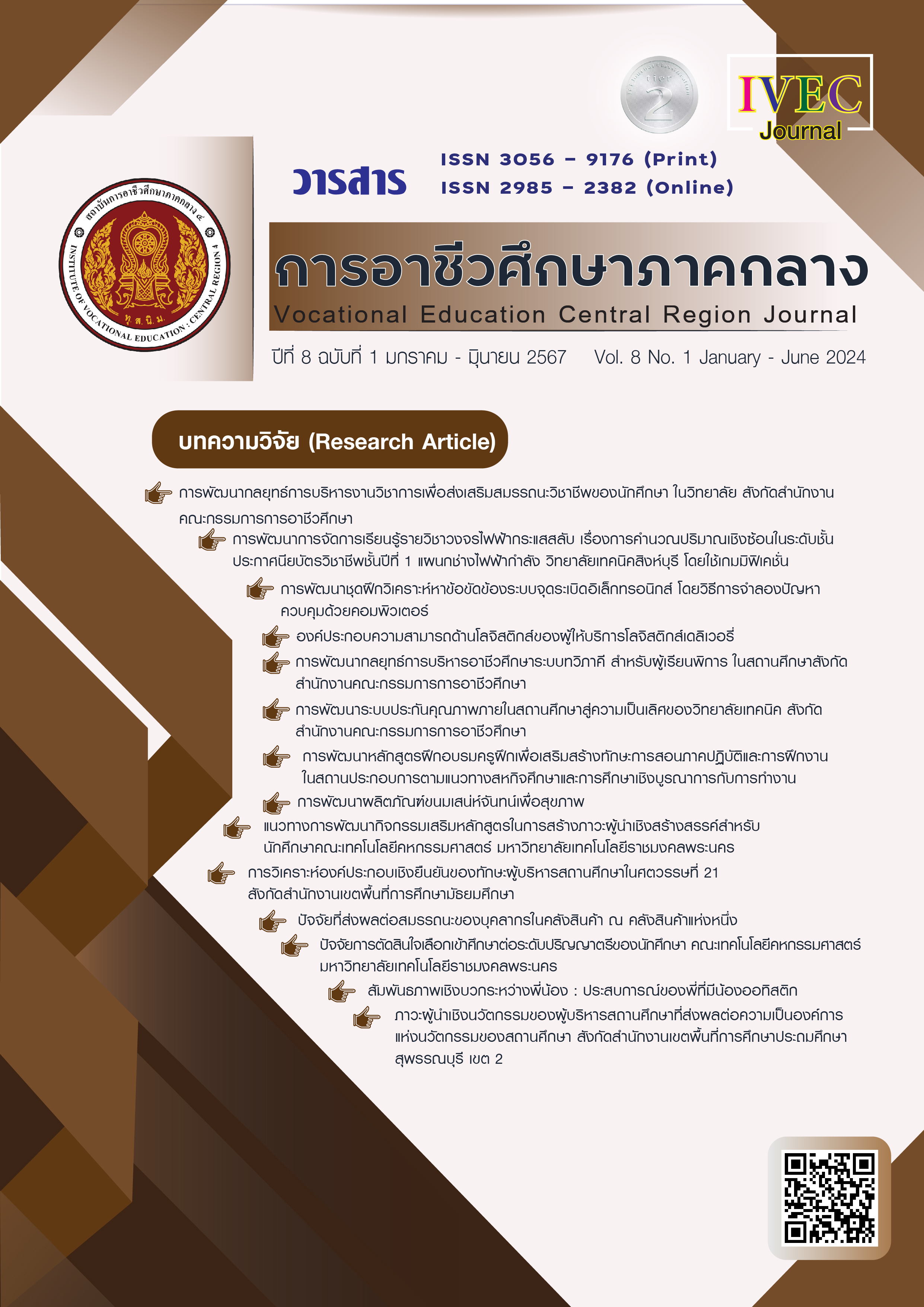School Administrators’ Innovative Leadership Affecting Schools’ Innovative Organization under Suphan Buri Primary Educational Service Area Office 2
Main Article Content
Abstract
The purposes of this research were to: 1) study the level of school administrators’ innovative leadership; 2) study the level of schools’ innovative organization; and 3) analyze the school administrators’ innovative leadership affecting the schools’ innovative organization. The sample consisted of 270 teachers from schools under Suphan Buri Primary Educational Service Area Office 2, derived by proportional stratified random sampling as distributed by district. The research instrument used was a questionnaire. Statistics used for data analysis were frequency, percentage, mean, standard deviation, and stepwise multiple regression analysis.
The research results were as follows: 1. Overall and in specific aspects, the level of school administrators’ innovative leadership was at a high level. The aspects were formulating educational quality development policy, creating a work culture towards educational innovation, creating learning environment and climates to support educational innovation, promoting educational innovation learning, and setting goals and indicators of educational innovation, respectively. 2. Overall and in specific aspects, the level of schools’ innovative organization was at a high level. The aspects were teamwork, organizational structure, leadership, organizational culture, human resource management, strategic management, organizational atmosphere, and knowledge management, respectively. 3. The school administrators’ innovative leadership in the aspects of creating a work culture towards educational innovation (X4), promoting educational innovation learning (X5), and formulating educational quality development policy (X1) affected the schools’ innovative organization (Ytot). These factors together predicted the schools’ innovative organization at a percentage of 64.30 with a statistical significance level of 0.05. The regression equation was: tot = 0.30 + 0.44 (X4) + 0.32 (X5) + 0.16 (X1)
Article Details

This work is licensed under a Creative Commons Attribution-NonCommercial-NoDerivatives 4.0 International License.
|
บทความ ข้อมูล เนื้อหา รูปภาพ ฯลฯ ที่ได้รับการตีพิมพ์ในวารสาร การอาชีวศึกษาภาคกลาง ถือเป็นลิขสิทธิ์ของวารสารการอาชีวศึกษาภาคกลางหากบุคคลหรือหน่วยงานใดต้องการนำทั้งหมดหรือส่วนใดส่วนหนึ่ง ไปเผยแพร่ต่อหรือเพื่อกระทำการใด ๆ กองบรรณาธิการไม่สงวนสิทธิ์ ในการคัดลอกบทความเพื่อการศึกษาแต่ให้อ้างอิงแหล่งที่มาให้ครบถ้วน สมบูรณ์ สงวนสิทธิ์ โดย สถาบันการอาชีวศึกษาภาคกลาง 4 ที่ตั้ง 90 ถนนเทศา ตำบลพระปฐมเจดีย์ อำเภอเมือง จังหวัดนครปฐม โทรศัพท์ 034 242 856 , โทรสาร 034 242 858 ISSN : 3056-9176 (print) ISSN : 2985-2382 (online) |
References
ขวัญชนก แสงท่านั่ง. (2563,กรกฎาคม). รูปแบบการพัฒนาสถานศึกษาสู่องค์กรแห่งนวัตกรรม สำหรับสถานศึกษาขั้นพื้นฐาน. สังคมศาสตร์และมนุษยวิทยาเชิงพุทธ, 5, (7), หน้า 153-168.
จันทร์แรม เรือนแป้น. (2561). ระเบียบวิธีการวิจัยทางสังคมศาสตร์. กรุงเทพฯ: เสมาธรรม.
ชาญณรงค์ วิเศษสัตย์. (2562). การพัฒนารูปแบบการเรียนรู้ส่งเสริมทักษะการคิดเชิงนวัตกรรมของนักศึกษาวิชาชีพครู. วิทยานิพนธ์ ปริญญาปรัชญาดุษฎีบัณฑิต สาขาวิชาหลักสูตรและการสอน บัณฑิตวิทยาลัย มหาวิทยาลัยมหาสารคาม.
ปรีชา ออกกิจวัตร. (2564). ความสัมพันธ์เชิงสาเหตุระหว่างองค์ประกอบภาวะผู้นำเชิงนวัตกรรมของผู้บริหารสถานศึกษาในยุคการศึกษา 5.0 สังกัดสำนักงานเขตพื้นที่การศึกษามัธยมศึกษาในภาคกลางและภาคตะวันออก. วิทยานิพนธ์ ปริญญาปรัชญาดุษฎีบัณฑิต สาขาวิชาการบริหารการศึกษา บัณฑิตวิทยาลัย มหาวิทยาลัยราชภัฏนครปฐม.
พระราชบัญญัติพื้นที่นวัตกรรมการศึกษา พ.ศ. 2562. (2562, 30 เมษายน). ราชกิจจานุเบกษา. เล่ม 136 ตอนที่ 56 ก, หน้า 102-120.
ภูเบศร์ บาลชน. (2563). โมเดลภาวะผู้นำของผู้บริหารสถานศึกษาที่ส่งผลต่อการเป็นองค์การนวัตกรรมของโรงเรียนประถมศึกษาในจังหวัดขอนแก่น: โมเดลแข่งขันภาวะผู้นำการเรียนรู้และภาวะผู้นำแบบร่วมพลัง. วิทยานิพนธ์ ปริญญาศึกษาศาสตรมหาบัณฑิต สาขาวิชาการบริหารการศึกษา บัณฑิตวิทยาลัย มหาวิทยาลัยขอนแก่น.
รัตนวดี โมรากุล, ดวงใจ ชนะสิทธิ์, นภาเดช บุญเชิดชู และ อรพรรณ ตู้จินดา. (2560, พฤษภาคม – สิงหาคม). การวิเคราะห์องค์ประกอบองค์การแห่งนวัตกรรมของ สถานศึกษาขั้นพื้นฐาน. Veridian E-Journal, Silpakorn University ฉบับภาษาไทย สาขามนุษยศาสตร์ สังคมศาสตร์ และศิลปะ, 10, (2) (2017), หน้า 2341-2355.
สำนักงานคณะกรรมการการศึกษาขั้นพื้นฐาน. (2562). คุณลักษณะของโรงเรียนประชารัฐ. กรุงเทพฯ: ชุมนุมสหกรณ์การเกษตรแห่งประเทศไทย.
สุกัญญา แช่มช้อย. (2560). การบริหารสถานศึกษาในยุคดิจิทัล. พิษณุโลก: มหาวิทยาลัยนเรศวร.
สุวิมล ติรกานันท์. (2557). ระเบียบวิธีการวิจัยทางสังคมศาสตร์ : แนวทางสู่การปฏิบัติ. กรุงเทพฯ: จุฬาลงกรณ์มหาวิทยาลัย.
อรุณี สุวรรณศรี. (2564). ภาวะผู้นำเชิงนวัตกรรมของผู้บริหารสถานศึกษาที่ส่งผลต่อประสิทธิผล การบริหารงานวิชาการของสถานศึกษาอาชีวศึกษาเอกชน ในภาคตะวันออกเฉียงเหนือ 3. วิทยานิพนธ์ ปริญญาครุศาสตรมหาบัณฑิต สาขาวิชาการบริหารการศึกษา บัณฑิตวิทยาลัย มหาวิทยาลัยราชภัฏร้อยเอ็ด.
อำภา ไชยทะ. (2563). ภาวะผู้นำเชิงนวัตกรรมของผู้บริหารที่ส่งผลต่อความเป็นองค์การนวัตกรรมของสถานศึกษา สังกัดสำนักงานเขตพื้นที่การศึกษาประถมศึกษาร้อยเอ็ด. วิทยานิพนธ์ ปริญญาครุ ศาสตรมหาบัณฑิต สาขาวิชาการบริหารการศึกษา บัณฑิตวิทยาลัย มหาวิทยาลัยราชภัฏร้อยเอ็ด.
Gunduz, Y., & Balyer, A. (2014). Examining Innovation Needs of Primary Schools:


